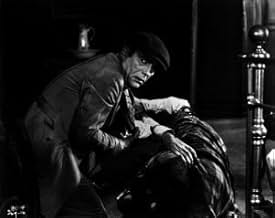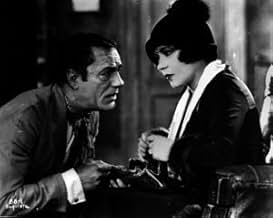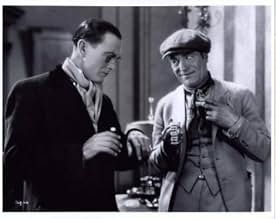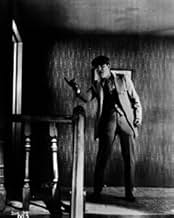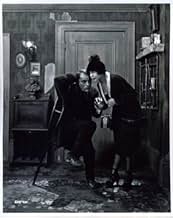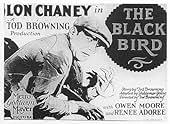Two thieves, the Blackbird and West End Bertie, fall in love with the same girl, a French nightclub performer named Fifi. Each man tries to outdo the other to win her heart.Two thieves, the Blackbird and West End Bertie, fall in love with the same girl, a French nightclub performer named Fifi. Each man tries to outdo the other to win her heart.Two thieves, the Blackbird and West End Bertie, fall in love with the same girl, a French nightclub performer named Fifi. Each man tries to outdo the other to win her heart.
- Director
- Writers
- Stars
- Awards
- 1 win total
Andy MacLennan
- The Shadow
- (as Andy Maclennan)
Charles Avery
- Music Hall Patron
- (uncredited)
Lionel Belmore
- Music Hall Proprietor
- (uncredited)
Margaret Bert
- Minor Role
- (uncredited)
Peggy Best
- Minor Role
- (uncredited)
Louise Emmons
- Old Lady at Mission
- (uncredited)
Willie Fung
- Chinese Man
- (uncredited)
Fred Gamble
- Man Saying There's a Present for Fifi
- (uncredited)
Joseph Hazelton
- Man at Table in Music Hall
- (uncredited)
Cecil Holland
- Old Man at Mission
- (uncredited)
Bertram Johns
- Member of Bertie's Slumming Party
- (uncredited)
- Director
- Writers
- All cast & crew
- Production, box office & more at IMDbPro
Featured reviews
Doctor Jekyll and Mister Hyde in a bad quarter of London : Lon Chaney plays a double role in the film and in the story, a robber (the Raven) and a man who carries about poor people (the Bishop). The way of acting is remarkable because it's a silent movie. The great thing is that the Bishop is half-paralyzed so Lon Chaney has to play the contorsionist when he moves from Raven into Bishop. The strange atmosphere is very well described with threatening faces and slumhouses.
London's Limehouse District, "with its lust, greed, and love," lightly blankets its citizens in a sea of fog. There, ambidextrous Lon Chaney (as Dan Tate) successfully spends his nights thieving as "The Blackbird"; and, otherwise, masquerading as his own benevolent, but deformed, brother "The Bishop". Mr. Chaney likes to visit the local pub, where he falls for charming French entertainer Renée Adorée (as Fifi Lorraine). But, Ms. Adorée also attracts suave Owen Moore (as Bertram P. Glayde). Mr. Moore is a rival crook, who goes by the name "West End Bertie". So, conniving Chaney uses his respectable "Bishop" disguise to come between the increasingly more successful Adorée-Moore romance.
This is a formulaic Browning/Chaney film, featuring one of the versatile actor's lesser "disguises". For his transformation, Cheney twists an arm and a leg out of shape. It's more difficult than it looks to walk around in the disjointed position. Of course, Chaney's performance is outstanding. In particular, watch his reaction shots, which are incredibly accurate in mirroring whatever he is looking at, or reacting to. Co-stars Moore and Adorée also shine. Adorée had just been seen in "The Big Parade", and Moore has one of his meatier 1920s roles. Also enjoyable is Doris Lloyd (as "Limehouse" Polly), the ex-wife who loves Chaney.
******* The Blackbird (1926) Tod Browning ~ Lon Chaney, Owen Moore, Renée Adorée
This is a formulaic Browning/Chaney film, featuring one of the versatile actor's lesser "disguises". For his transformation, Cheney twists an arm and a leg out of shape. It's more difficult than it looks to walk around in the disjointed position. Of course, Chaney's performance is outstanding. In particular, watch his reaction shots, which are incredibly accurate in mirroring whatever he is looking at, or reacting to. Co-stars Moore and Adorée also shine. Adorée had just been seen in "The Big Parade", and Moore has one of his meatier 1920s roles. Also enjoyable is Doris Lloyd (as "Limehouse" Polly), the ex-wife who loves Chaney.
******* The Blackbird (1926) Tod Browning ~ Lon Chaney, Owen Moore, Renée Adorée
Caught this one at the Film Forum in NYC recently. I have not seen a great deal of Lon Chaney's work outside of 'Phantom' and 'The Hunchback of Notre Dame' but I thought he was excellent in his dual role in 'The Blackbird'. In fact, he carried the picture and the rest of the cast in this fairly routine melodrama set in the Limehouse district of 1920's London.
Had not seen Owen Moore before but I felt he was very competent. A veteran of silents, he died prematurely in the late '30's. Renee Adoree was a perky ball of fluff and added her good looks to the proceedings.
I did think the premise of the story was a stretch, especially as he presumably hoodwinked his ex-wife as well as all others with his dual-existence duplicity. The sets and the extras seemed extremely authentic and added immeasurably to the production.
This was worth the price of admission, especially Chaney's virtuoso performance. I hope to see others in the future to determine if this was an exception or the norm.
Had not seen Owen Moore before but I felt he was very competent. A veteran of silents, he died prematurely in the late '30's. Renee Adoree was a perky ball of fluff and added her good looks to the proceedings.
I did think the premise of the story was a stretch, especially as he presumably hoodwinked his ex-wife as well as all others with his dual-existence duplicity. The sets and the extras seemed extremely authentic and added immeasurably to the production.
This was worth the price of admission, especially Chaney's virtuoso performance. I hope to see others in the future to determine if this was an exception or the norm.
Blackbird, The (1926)
*** (out of 4)
Lon Chaney plays duel roles in this crime melodrama from MGM. The Blackbird, a mastermind criminal and The Bishop, his crippled brother who is loved by everyone in the town. They're both the same person and the plan is to keep it that way but soon another criminal (Owen Moore) enters the picture as well as the love for a woman (Renee Adoree). I've know seen every Chaney feature that is currently not lost and I must say my appreciation of him as an actor has never been so high. I've always looked at him as one of the greatest actors in film history but after seeing this film I might go even further to call him the greatest actor in the silent era. It's really amazing at how brilliant this guy was and his acting abilities are on full display here. The viewer is the only one who knows that Chaney, playing both Blackbird and Bishop, are the same person yet like the characters in the film we forget because at how wonderful Chaney is. You could call this a Jekyll and Hyde type role as we're seeing good and evil and I'd probably say this is the greatest performance at that type of characters. How evil Chaney can come off and then how nice and holy is just amazing to watch and he really sells these characters perfectly. It's also rather amazing watching him play a cripple and deform his own body. Both Moore and Adoree add nice support but it's clear who this picture belongs to. Browning also should get a lot of credit because the screenplay here isn't too original nor is the love story that breaks out and controls most of the running time. While it's not original Browning does bring a lot of style to it and makes the movie flow like a stream. I've never been too fond of his sound features but I think his silents make him one of the most visual directors out there.
*** (out of 4)
Lon Chaney plays duel roles in this crime melodrama from MGM. The Blackbird, a mastermind criminal and The Bishop, his crippled brother who is loved by everyone in the town. They're both the same person and the plan is to keep it that way but soon another criminal (Owen Moore) enters the picture as well as the love for a woman (Renee Adoree). I've know seen every Chaney feature that is currently not lost and I must say my appreciation of him as an actor has never been so high. I've always looked at him as one of the greatest actors in film history but after seeing this film I might go even further to call him the greatest actor in the silent era. It's really amazing at how brilliant this guy was and his acting abilities are on full display here. The viewer is the only one who knows that Chaney, playing both Blackbird and Bishop, are the same person yet like the characters in the film we forget because at how wonderful Chaney is. You could call this a Jekyll and Hyde type role as we're seeing good and evil and I'd probably say this is the greatest performance at that type of characters. How evil Chaney can come off and then how nice and holy is just amazing to watch and he really sells these characters perfectly. It's also rather amazing watching him play a cripple and deform his own body. Both Moore and Adoree add nice support but it's clear who this picture belongs to. Browning also should get a lot of credit because the screenplay here isn't too original nor is the love story that breaks out and controls most of the running time. While it's not original Browning does bring a lot of style to it and makes the movie flow like a stream. I've never been too fond of his sound features but I think his silents make him one of the most visual directors out there.
By contrast, I was relatively satisfied with THE BLACK BIRD. The plot is somewhat derivative (particularly of THE PENALTY [1920]), but Chaney is in fine form here. The film goes a long way in simulating the Limehouse atmosphere, even where dialogue is concerned (which comes off as fairly hilarious if quite endearing).
The romantic leads, as played by Owen Moore and Renee' Adoree', are above average in this case; in fact, Moore (as a gentleman crook) is more of an anti-hero here and creates an interesting contrast to Chaney, who himself alternates between the villainous 'Black Bird' and the saintly 'Bishop' throughout.
For a Browning/Chaney effort, the film is fairly conventional and comes off as somewhat protracted (particularly the overly contrived ending) when compared to THE UNKNOWN (1927). Chaney's (deceptive) physical deformity of his 'Bishop' character is the sole weird element in evidence and, for once, here we get a chance to observe - on camera - the way Chaney accomplishes this amazing feat!
The romantic leads, as played by Owen Moore and Renee' Adoree', are above average in this case; in fact, Moore (as a gentleman crook) is more of an anti-hero here and creates an interesting contrast to Chaney, who himself alternates between the villainous 'Black Bird' and the saintly 'Bishop' throughout.
For a Browning/Chaney effort, the film is fairly conventional and comes off as somewhat protracted (particularly the overly contrived ending) when compared to THE UNKNOWN (1927). Chaney's (deceptive) physical deformity of his 'Bishop' character is the sole weird element in evidence and, for once, here we get a chance to observe - on camera - the way Chaney accomplishes this amazing feat!
Did you know
- TriviaThe Blackbird (Lon Chaney) was called The Mocking Bird in earlier versions of the film.
- Quotes
Woman with Diamond Choker: I say... we are going down Plum Alley to see the Chinkies smoking.
West End Bertie: I say... shall we go?
- ConnectionsFeatured in MGM: When the Lion Roars (1992)
Details
- Release date
- Country of origin
- Languages
- Also known as
- The Blackbird
- Filming locations
- Production company
- See more company credits at IMDbPro
Box office
- Budget
- $166,000 (estimated)
- Runtime
- 1h 26m(86 min)
- Color
- Sound mix
- Aspect ratio
- 1.33 : 1
Contribute to this page
Suggest an edit or add missing content


